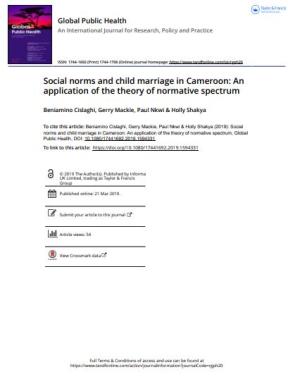- Case study
- 1 Septiembre 2021
New roles for grandmothers in Cameroon’s conflict zone
- Author: Saint Albert's Charity
- Published by: ALIGN
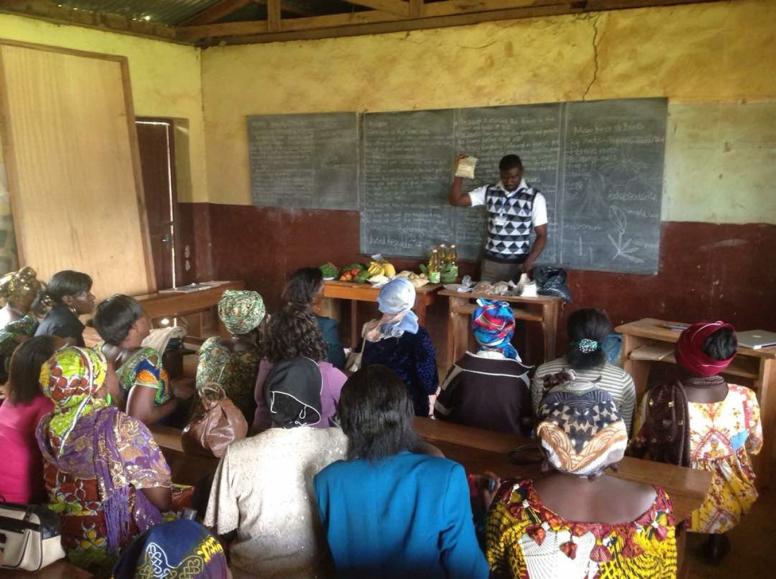
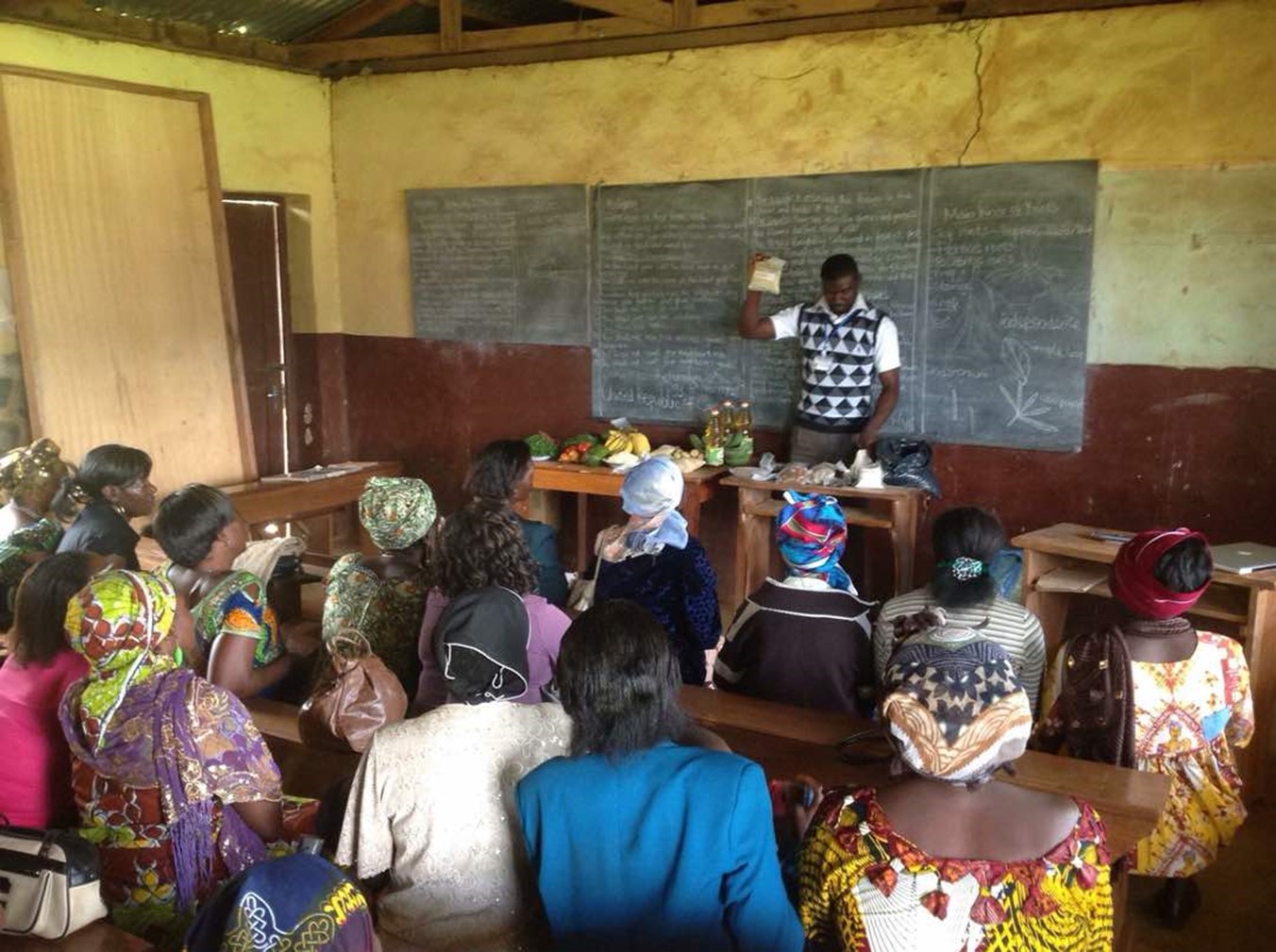
In Cameroon, as in many countries, rigid gender norms shape how women and men are seen and the distinct roles they have in everyday life. This case study examines how conflict in the Northwest region of Cameroon, between the Government and armed separatist fighters, has had on gender roles, particularly those relating to grandmothers.
The impact of conflict
While some norms and traditions may harden in the face of challenges, others may shift or even collapse under the pressure of conflict as communities adapt their everyday tasks such as finding food, water, shelter, or safety, to their new realities.
This can be seen in Northwest Cameroon where, as a result of the ongoing conflict in the area, some cultural practices have started to change hands and women are now performing roles once considered to be meant for men only. One notable example is that grandmothers – who are already vulnerable and marginalised members of local communities – are among the most severely affected, as they are often left behind to care for the young while others leave, or have been killed in the fighting, and are, in many cases, also widows.
These grandmothers – and the children they care for – have to contend with almost daily military incursions, curfews, movement restrictions, targeted killing, kidnapping, arrests, humiliation, acts of terror and the activities of armed groups, as well as severe economic hardship and poverty.
They have suffered the trauma of losing relatives and/or friends, of torture, of witnessing violence, of being separated from loved ones, as well as injuries, including those that have left them with life-changing deformities or disabilities. They have often witnessed the burning of their own villages and the mass destruction of property. The impact has included children being unable to attend school for years, gender-based violence (mainly physical and sexual abuse), sexual harassment and exploitation, and the targeting of adolescent girls and women.
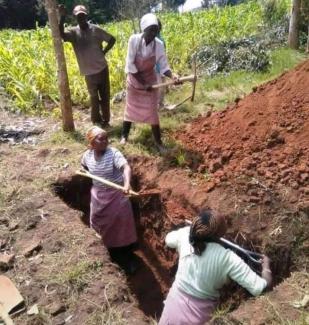

Charity
New roles for grandmothers
Many villages have become ‘ghost towns’, deserted and abandoned, and now occupied by grandmothers and children; while men, young adults and adolescent girls are easy targets of the military and armed groups. To make matters even more challenging, many grandmothers lack education, face overwhelming poverty, and are often stigmatized as a result. Now the current crises has left them at home, often with very young children, and has forced them to take on three key roles that have always been considered as male domains, simply because they have no other choice:
- Household heads – as they now have to provide food, fetch and split firewood for cooking, provide household security, repair leaking roofs or even build new houses when the old ones are destroyed as a result of the conflict, work the farm, transport crops and pay utility bills, in addition to taking care of young children.
- Undertaking on responsibilities in the community – when someone dies, the responsibility for digging the grave and conducting burial rights has always been firmly in the hands of men – mostly younger men who had the strength and energy to carry out this heavy work. Now, however, this task falls on women and, in particular, on grandmothers. There is also the responsibility of repairing broken roads and bridges, taking children to hospital and paying the hospital bills, and becoming the ‘custodians’ of local culture as they perform traditional rites once reserved for men.
- Economic providers – grandmothers now have to generate income for their families through different means, such as transporting and selling farm produce, as well as keeping and managing the money they earn. This was unheard of before the conflict when men managed all family finances and decided how their money was spent.
Approach of Saint Albert Charity
Meeting basic needs
We use a rights-based approach to address issues faced by grandmothers as a result of the changing social context. Despite their suffering, they find the time to come to us to learn about their human rights and to see their new roles as normal, regardless of earlier taboos. Because grandmothers are often considered by society and, in particular by men, to be weak, Saint Albert’s supports them in ways to ease any societal tension and stress related to the changing ways in which they now have to function. The assistance they receive is based on humanitarian principles and we try to reach out to as many affected women as possible.
As a result of the conflict and the changing pattern of roles played by women (particularly elderly women), Saint Albert Charity started to focus its work by providing care and support to grandmothers, orphaned children, younger women and adolescent girls most acutely affected. We pay particular attention to the most elderly women as they now form the majority of care-givers and, most importantly, because of their vulnerability.
We have been providing them with nutritious, energy-rich food as well as medications that are hard to come by as a result of closure of hospitals and health facilities. We are also providing farming aids such as rudimentary tools, seeds and pre-manufactured organic manure.
By removing some of the stress from their daily activities, we aim to ensure that those we are supporting have enough time to take care of the very young ones. Saint Albert Charity has also organised working sessions with grandmothers in the communities to identify their major problems and lobby with the available stakeholders to help provide the assistance they need.
Providing psychological support
Saint Albert Charity has been working with grandmothers who have been profoundly affected by new responsibilities and pressures over the past four years. These changes have been driven largely by the conflict but now the COVID-19 pandemic has exasperated the challenges grandmothers were already facing by restricting their movement and making it even harder to generate income to meet basic family needs. Coupled with this is the risk of exposure to other illnesses such as malaria. Without the financial support and therefore health security provided by husbands and sons, the grandmothers and young children are even more vulnerable.
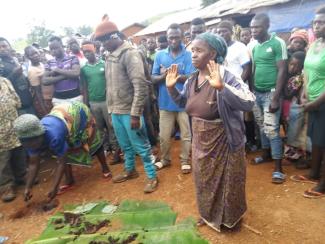

communities to reduce stigma associated
with women digging graves.
© Saint Albert's Charity
As well as providing food and material assistance to women and lobbying for recognition of the new roles women are undertaking, Saint Albert Charity has also provided counseling to women who have suffered the emotional burden of not only losing loved ones but burying family members and picking up the pieces for orphaned children left behind. These women now have to adopt to new roles and responsibilities traditionally seen as male with heavy stigma and taboo attached to women’s involvement, with no training and little support. We have hired highly-trained psychologists who provide daily support and counselling. Women we talk to have said, for example: ‘we keep praying to have an end to this war as we are now community watch dogs playing roles of men here.’ They cannot quite believe that they must now play different roles, and this to them is ‘unheard of’.
Continued challenges in coping with changed norms
Though we provide food assistance to families to reduce the burden on grandmothers as a result of their changing roles, these women do not find it easy to accept such ‘foreign food’, as it is part of their culture to eat the food they cultivate themselves on their farms. Yet the conflict has left them fearing for their lives when working in their fields as many have been shot while doing so. Again, however, the men whom they once relied on for their security are no longer there. Their livelihood patterns are being reshaped against their wishes and they find it difficult to accept this and continue to brave the odds.
More equitable societies
The effects of the conflict on the individual, the family and the community will be long lasting. Saint Albert’s is working to support those in need of assistance and allow the grandmothers and others to build a brighter future. This will also means overcoming any taboos around the role women, particularly grandmothers, now play in communities.
Grandmothers have always acted as care-givers, so they do see value in their expanded caregiving roles. However, they find it hard to dig graves and carry out other roles once assumed by men. The lack of confidence the women exhibit is not just because they are taking on new gender roles: it is rather because they have never been equipped with responsibility and power before, with men assuming the most powerful places in society. More equitable sharing of responsibilities, power over resources, and equality within households and the wider community would better enable societies to adapt more easily when faced with change and challenge.
Related resources
Briefing paper
25 Agosto 2021
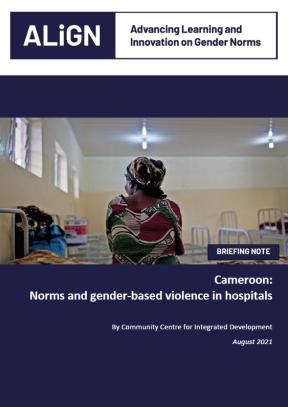
Journal article
21 Marzo 2019
